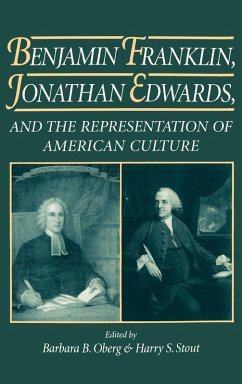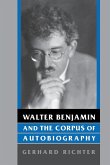This is an interdisciplinary collection of comparative essays which look at aspects of the thought of Jonathan Edwards and Benjamin Franklin and consider the place of these two men in American culture. The essays have their origin in a conference held at Yale University, the home of the modern editions of the papers of both these 18th century American thinkers. Franklin and Edwards are probably the two most studied colonial figures and have often been the subject of comparative exercises. In such studies, they have often been treated as having the characteristics of mutually exclusive ideal types and set into categories as different and opposed as 'traditional' and 'modern.' In the present volume, however, polemical contrasts disappear and Edwards and Franklin emerge as contrapuntal themes in a larger unity.
No colonial figures so completely anticipated the shape of American culture - at once material and spiritual, piously secular and pragmatically sacred - as did Jonathan Edwards and Benjamin Franklin. Commonly labeled "Puritan" and "Yankee" respectively, Edwards and Franklin evoke seemingly opposite ideals. Puritan values, embraced by Edwards and sustained in American "evangelicalism", focus on God, communal faith, and self-denial. Yankee attributes, espoused by Franklin and sustained in American liberal republicanism, coalesce around the trinity of hard work, independent virtue, and utilitarian self-happiness. For two and a half centuries these alternative emphases and orientations have coexisted in uneasy tension both individually and in American society at large. In contrast to traditional comparative studies, which portray Edwards and Franklin as mutually exclusive ideal types, this interdisciplinary collection of essays allows polemical contrasts to disappear and Edwards and Franklin emerge as contrapuntal themes in a larger unity. From these essays, written by distinguished historians and literary critics such as Ruth Bloch, Edwin S. Gaustad, Daniel Walker Howe, J. A. Leo Lemay, and David Levin, emerges a portrait of two men who shared a common concern with mind, character, and virtue that shaped a legacy that would define much of American character for generations to come.
No colonial figures so completely anticipated the shape of American culture - at once material and spiritual, piously secular and pragmatically sacred - as did Jonathan Edwards and Benjamin Franklin. Commonly labeled "Puritan" and "Yankee" respectively, Edwards and Franklin evoke seemingly opposite ideals. Puritan values, embraced by Edwards and sustained in American "evangelicalism", focus on God, communal faith, and self-denial. Yankee attributes, espoused by Franklin and sustained in American liberal republicanism, coalesce around the trinity of hard work, independent virtue, and utilitarian self-happiness. For two and a half centuries these alternative emphases and orientations have coexisted in uneasy tension both individually and in American society at large. In contrast to traditional comparative studies, which portray Edwards and Franklin as mutually exclusive ideal types, this interdisciplinary collection of essays allows polemical contrasts to disappear and Edwards and Franklin emerge as contrapuntal themes in a larger unity. From these essays, written by distinguished historians and literary critics such as Ruth Bloch, Edwin S. Gaustad, Daniel Walker Howe, J. A. Leo Lemay, and David Levin, emerges a portrait of two men who shared a common concern with mind, character, and virtue that shaped a legacy that would define much of American character for generations to come.









